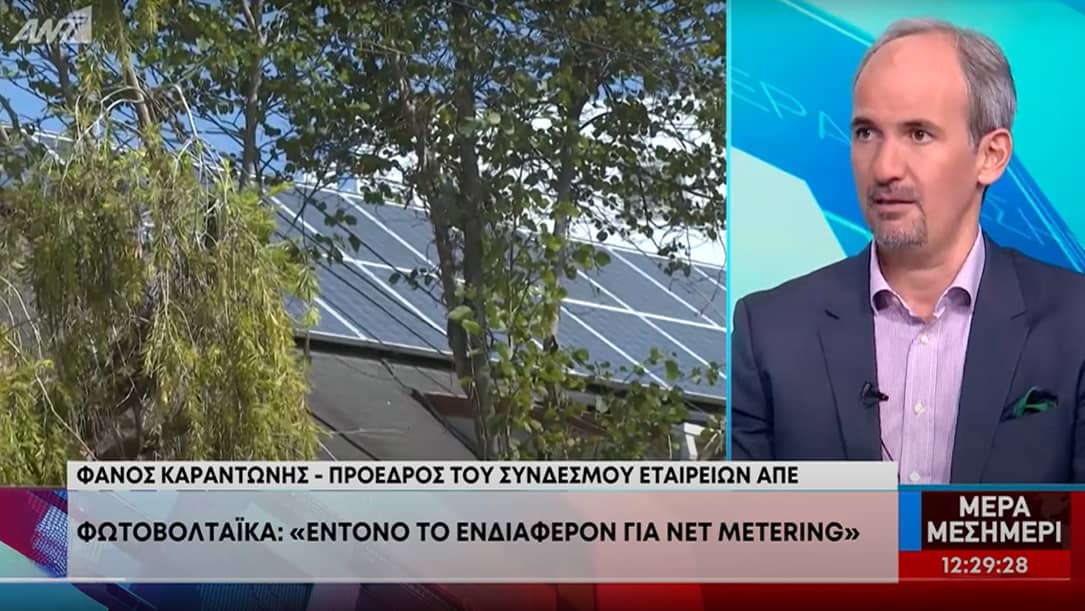On the “Mera Mesimeri” program of ANT1, Mr. Fanos Karantonis, Director of our company and President of the Association of RES Companies, discussed the major changes coming to Net Metering and Net Billing, and what they mean for consumers in Cyprus.
The conversation covered all the critical topics, from upgrades of older systems to upcoming curtailments to the new regulatory framework currently under consultation.
1. High interest in installing and upgrading photovoltaic systems
Mr. Karantonis confirmed that many citizens are rushing to install or upgrade their PV systems before the current Net Metering framework changes.
- Until the end of the year, consumers can:
- Expand their existing system
- Apply for new connection terms
- Sign a new 15-year Net Metering contract
This applies both to systems whose contracts are expiring and systems being upgraded.
2. What does “system upgrade” mean?
Older PV systems (e.g., installed between 2013 and 2025) can be upgraded by:
- Adding or replacing panels
- Replacing the inverter
Such an upgrade allows the owner to sign a new contract, securing another 15 years under the Net Metering scheme.
Even if the upgraded system might face some curtailments, the extended duration is a major advantage.
3. Net Metering Today: How does it work?
Current Net Metering works through monthly energy offsetting:
- Energy exported → credited on the bill
- Energy imported → deducted from the balance
- Excess kWh can be carried forward from billing period to billing period
The consumer effectively saves money because they don’t pay for the electricity they produce, only the fixed EAC charges.
Today, around 85,000 households in Cyprus use Net Metering.
4. Net Billing: How is it different?
Under Net Billing, the consumer:
- Does not accumulate kWh in the same way
- Excess energy is compensated at a predefined rate (currently approx. €0.11/kWh)
- Offsetting is monetary, not energy-based
Mr. Karantonis emphasized that the two systems are different, and the new model that will replace them is not yet finalized.
5. What do we expect from the new framework?
A clear announcement is expected from the relevant authorities to determine how the next era of self-consumption will operate, likely with a new name and structure.
The matter remains under consultation.
6. Curtailments: Why they happen and why they won’t disappear
Mr. Karantonis clearly stated:
“Curtailments are here to stay.”
The main reasons:
- High solar output in spring & autumn
- Mild temperatures → low electricity demand
- Households produce energy while away at work
- The grid cannot absorb all the excess energy
Battery storage will help, but it will not eliminate curtailments.
7. How many households in Cyprus have PV systems?
- 85,000 households use Net Metering
- Cyprus has approx. 250,000 single-family homes
- Therefore, 1 in 3 homes already has a PV system
The trend continues to rise.
8. What happens with existing contracts?
- All active contracts remain valid for their full 15-year duration
- Consumers do not need to take any action
- Only system upgrades require a new contract
Once contracts expire, households will transition to the new scheme that will be in place at that time.
Conclusion: Now is the right time to act
Mr. Karantonis emphasized that:
- Solar energy will remain highly cost-effective
- Consumers still have time (until year-end) to benefit from the current framework
- A system upgrade can “renew” Net Metering benefits for another 15 years
Self-consumption in Cyprus not only remains a core energy strategy, but it is also strengthening as one of the most reliable ways to reduce electricity costs and achieve greater energy independence.
